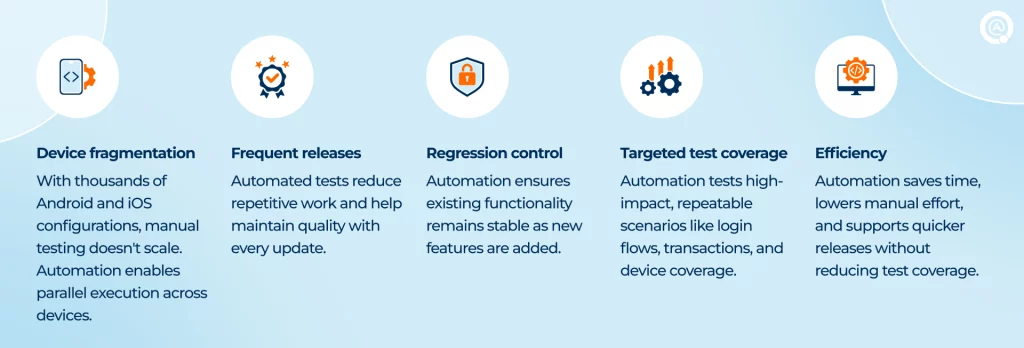Automation Testing for Mobile Apps: Why It’s Essential and Our Key Services
by Yuliia Starostenko | May 13, 2025 1:49 pm
Mobile applications are essential for businesses to interact with users and provide services in a digital environment. Rising expectations for speed, stability, and cross-device compatibility have made it increasingly challenging to maintain high product quality. Automation testing for mobile apps offers a powerful solution, enabling teams to optimize testing efforts and enhance app dependability.
This guide highlights the critical role of automation in mobile testing and introduces the key services provided by QATestLab to support this process.
Why Mobile Test Automation Is Essential
Mobile applications must perform consistently across various devices, operating systems, screen sizes, and network conditions. With increasing product complexity and shorter release cycles, many teams use automation to scale their testing efforts and maintain quality.
Here are the most common reasons why mobile test automation becomes a valuable part of the QA process:
- Device fragmentation: With thousands of Android and iOS configurations, manual testing doesn’t scale. Automation enables parallel execution across devices.
- Frequent releases: Automated tests reduce repetitive work and help maintain quality with every update.
- Regression control: Automation ensures existing functionality remains stable as new features are added.
- Targeted test coverage: Automation tests high-impact, repeatable scenarios like login flows, transactions, and device coverage.
- Efficiency: Automation saves time, lowers manual effort, and supports quicker releases without reducing test coverage.

| Pro tip: Start automation with intricate scenarios like data-heavy forms or multi-device handoffs. These complex cases thrive under consistent, automated scrutiny, allowing manual testers to focus on creative, user-centric exploration.
Automation is most effective when applied selectively, not universally. The best outcomes come from targeting high-value areas like stable, repeatable scenarios (e.g., logins or payment flows), regression checks, cross-device validation, and data-driven tests. When used strategically, automation handles repetitive tasks efficiently, allowing QA teams to allocate more time to exploratory and usability testing.
Mobile Test Automation Services Provided by QATestLab
QATestLab offers a practical set of mobile test automation services to help teams release stable, high-performing apps across various devices and environments.
Our primary services include:
1. Functional Testing
We craft precise automated scripts to confirm the flawless performance of critical features like logins and checkouts on all supported platforms.
2. Performance Testing
We push your app to its limits, simulating intense real-world use to ensure speed and stability under any condition.
3. Cross-Device Test Automation
We run automated test suites on multiple real and virtual devices using platforms like BrowserStack to ensure consistent behavior across Android and iOS configurations.
4. Regression Testing
We swiftly detect disruptions from updates with automated suites that keep existing features rock-solid.
5. API Test Automation
We validate backend functionality with fast, stable automated tests that verify data exchange, error handling, and app-to-server interactions.
6. Automation Framework Setup & Maintenance
We design and support custom automation frameworks tailored to your mobile app’s architecture, ensuring long-term scalability and ease of updates.
These services address the typical testing needs of mobile applications throughout the development cycle. If you’re looking for another type of testing not listed here, feel free to contact us[1] — we offer a broader range of QA services tailored to different product requirements.
Final Thoughts
Teams working with growing mobile products often face speed, coverage, and release stability challenges. Automation makes testing more scalable, reduces delays, and improves control over quality without overloading QA teams.
To solve these challenges, many companies turn to QATestLab. They rely on us when they need to:
- Keep releases stable despite frequent changes,
- Reduce the time spent on repetitive testing tasks,
- Ensure consistent performance across a fragmented mobile environment.
Our team helps set up automation workflows that match each client’s product architecture, release cycles, and QA priorities — from scratch or as part of an existing process.
Want to improve your mobile testing process? [2] Get in touch[3] — let’s talk!

Learn more from QATestLab
Related Posts:
- contact us: https://go.qatestlab.com/contactus
- : https://qatestlab.com
- Get in touch: https://go.qatestlab.com/contactus
- How One Bug Can Wreck Your Reputation — And How QA Prevents It: https://blog.qatestlab.com/2025/04/01/how-one-bug-can-wreck-your-reputation-and-how-qa-prevents-it/
- Testing on Real Devices — Just an Option or a Necessity?: https://blog.qatestlab.com/2025/01/08/real-testing-devices/
- QA Automation Tools: Low-Code, No-Code, or Coding-Based?: https://blog.qatestlab.com/2025/03/27/qa-automation-tools-low-code-no-code-or-coding-based/
Source URL: https://blog.qatestlab.com/2025/05/13/automation-testing-for-mobile-apps-why-its-essential-and-our-key-services/

